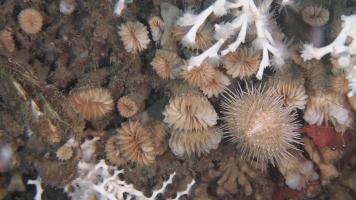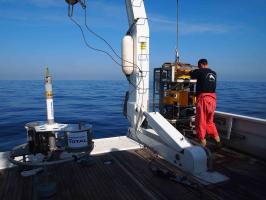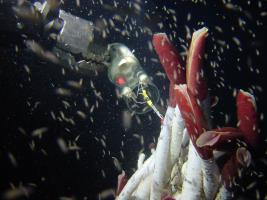Master of Science of the Universe, Environment, Ecology
Speciality: Océanography and marine Environments (UPMC/SDUEE/OEM)
International Master of Science in Marine Biodiversity and Conservation
(ERASMUS Mundus EMBC+)
*********************************************************
3 weeks (6 ECTS)
Observatoire Océanologique de Banyuls-sur-Mer (http://www.obs-banyuls.fr)
Coordination : N. Le Bris, lebris @ obs-banyuls.fr , F. Lartaud, This email address is being protected from spambots. You need JavaScript enabled to view it.

General objectives:

Unique biodiversity hotspots have been discovered on the ocean floor in a variety of extreme environments. While human pressures on the deep-sea are increasing, there is a great need for research and expertise to better assess the functions of these ecosystems and their sensitivity to disturbance. Defining effective conservative strategies however requires improving the knowledges of functional relationships between species and their environment. This interdisciplinary course introduces the current knowledge of the dynamics and functioning of model ecosystems from hydrothermal vents, submarine canyons or methane seeps, as well as generic features associated with deep-sea corals and organic falls. Lectures and seminars by international experts will focus ont the challenges of deep-sea research and conservation, highlight the most recent scientific issues and findings and the promises of novel experimental approaches and techniques (omics, in situ sensors).

The ultimate aim of this course is to provide a comprehensive view of the biotic and abiotic drives and their interactions in deep-sea biodiversity hotspots, with special emphasis on the following points:
- Properties and distribution of deep-sea extreme environments
- Biological adaptations and deep-sea ecosystem functioning and dynamics
- Linkages between biogeochemical cycles and ecosytem functions in the deep-sea
- Recent advances in underwater technology and in situ approaches for deep-sea research
- Initiatives and challenges for the conservation of deep-sea biodiversity hotspots
Keywords:
1) Hydrothermal vents, cold seeps, canyons
2) Cold water corals, organic falls, sunken woods
3) Chemosynthesis and energy pathways
4) Geosphere and biosphere interaction
5) Adaptation to environmental extremes
6) Conservation of deep-sea biodiversity hotspots
7) Exploration, experimentation and observation
Initial competences:
Basics in biology and chemistry. background in marine sciences appreciated but not prerequisite.
Credits: 6 ECTS: Written exam (60/100). Bibliographic project (40/100).